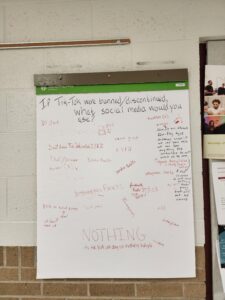
The recent TikTok “ban” bill that has passed through the House of Representatives is concerning for many people.
The app is used by many to connect with friends, share videos, watch videos and consume funny and useful content.
Political science professor David Takitaki explained how the bill works.
“This is not a complete ban, that is not what the bill does,” Takitaki said. “What the bill does is create a situation in which the ByteDance corporation, which is owned by the Chinese government, would either have to divest or sell the TikTok corporation within 180 days.”
There are also legal issues that would be faced for anyone who continued to use the app after it is banned.
“The bill would prevent American companies like Apple or Google from hosting TikTok on their platforms,” Takitaki said. “Americans who continue to use the app wouldn’t face legal penalties, but it would likely be deprecated. This means users wouldn’t receive updates, leading to eventual breakdown from lack of maintenance.”
Marketing professor Susan K. Jones specializes in digital marketing on social media.
Jones expressed that she thought the ban was a little late, “With 170 million users, including 1/3 of American adults using TikTok, it seems a little late out of the gate for legislators to get upset about it now,” Jones said.”170 million people’s data is already at TikTok, so if this is shut down, it doesn’t mean the data is gone.”
Many people argue that this bill is censorship, or taking away their free speech.
“You can still say everything you wanted to say, but what you’re missing is this network, this structure, this broadcast, which is technically owned by someone else,” Takitaki said. “If you lose access to that, you are not losing your right to speak, you are losing your ability to have that speech amplified.”
According to TikTok 41% of users are gen-z. Some just observe by watching videos, while others make videos. TikTok is also used to grow small businesses and advertise products in different fields like politics. Marketing freshman Santana Garci used TikTok for her job back home.
“I use TikTok to showcase dresses on an actual body rather than using just model pictures,” Garcia said. “I use it to show customers what it looks like on people who work with us, and people our age going to prom. People that are in high school use TikTok more than any other social media.”
TikTok is also a huge platform for advertisers to get their content out there for people to see.
“TikTok is great for advertising because I see companies using TikTok and fun ways they’re not just saying this is an ad and here’s my product and here’s what it can do for you. They’re setting up little stories and then integrating the product into that,” Jones said. “It’s more innovative than what I’ve seen on other social media.”
Both Jones and Garcia use TikTok personally and express that the app can become addicting.
“I can almost guarantee 90% of people in college if you look at their screen time, it’s mostly on TikTok,” Garcia said. “It’s really hard to be motivated in school, get your work done, or be productive when every two seconds you feel the need to get on TikTok.”
Although the TikTok “ban” may not have passed yet, users may want to start looking at alternative platforms, like Instagram reels or YouTube shorts.
CE – RS / CF / AM
